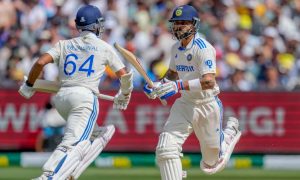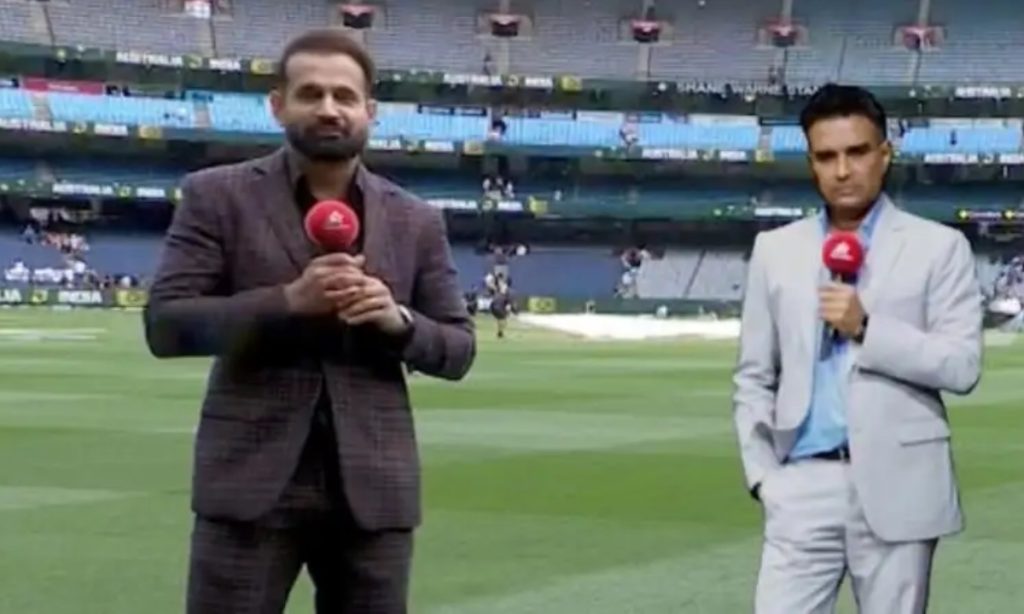In the world of cricket, few things stir up as much passion and debate as a mix-up between batsmen leading to a run-out. The fourth Test match between Australia and India in the 2024-25 series was no exception, where a pivotal moment involving Virat Kohli and Yashasvi Jaiswal not only changed the course of the game but also sparked a fiery discussion among cricket analysts Irfan Pathan and Sanjay Manjrekar on live TV.
The Incident at Melbourne Cricket Ground
On Day 2, with the scoreboard reading 164-5 in 46 overs, Jaiswal and Kohli had stitched together a promising partnership of 102 runs, looking set to guide India to a commanding position. However, what followed was a moment of miscommunication that led to Jaiswal’s departure for 82. The incident occurred on Scott Boland’s bowling, where a seemingly innocuous delivery led to a fatal misunderstanding between the two Indian stalwarts.

Jaiswal, keen on turning the strike over, called for a quick single, but Kohli, perhaps unsure of the run’s safety, hesitated. This hesitation was all it took for Jaiswal to be caught short of his crease, run out for 82, a score that was looking like the foundation for a much larger tally. Following this, Kohli too couldn’t hold his ground for long, getting dismissed for 36, further deepening India’s woes.
Post-Match Analysis Heats Up
The incident didn’t just end with the fall of wickets; it spilled over into the post-match analysis, where former cricketers Sanjay Manjrekar and Irfan Pathan engaged in a heated argument on live television. Manjrekar, known for his forthright opinions, had a clear view on the incident:
“Ball was going slow, I don’t think Kohli would’ve been runout. It was Jaiswal’s call. Maybe a risky run but he was at the danger end, not Kohli. It was a schoolboy error from Virat that he looked back and decided it wasn’t a run. If it was a bad call from Jaiswal, he would’ve gotten out at the non-striker’s end,” Manjrekar said.
Manjrekar’s frustration grew as Pathan continued to offer his differing perspective, leading to Manjrekar’s sarcastic remark, “Irfan Pathan’s new interpretation of whether it is a run or not, should be added to the coaching manual.” The debate took a personal turn when Manjrekar suggested that Kohli’s subsequent dismissal might have been influenced by guilt over Jaiswal’s run-out:
“Kohli’s dismissal probably also down to the guilt he had inside his heart over Jaiswal’s run-out. He was leaving outside-off deliveries until then but lost his concentration after the run-out incident,” he said.
On the other side, Pathan defended Kohli, arguing that the run wasn’t as straightforward as Manjrekar made it out to be. He emphasized the speed at which the ball reached the fielder, Pat Cummins, and Kohli’s right to turn down a risky run:
Sanjay Manjrekar and Irfan Pathan heated argument over Jaiswal runout#INDvsAUS #AUSvIND #Melbourne #YashasviJaiswal #ViratKohli #SanjayManjrekar #IrfanPathan #Australia pic.twitter.com/E8xI1mxnTw
— Kishor Joshi (@KishorJoshi02) December 27, 2024
“Irfan, on the other hand, countered Manjrekar’s version, saying Kohli probably wasn’t confident taking the run as he saw how fast the ball went to the fielder, Pat Cummins. The former India all-rounder also maintained that as a non-striker, Virat also has the right to turn down a run if he feels it is risky.”
The exchange between the two commentators was intense enough that at one point, Manjrekar had to assert his right to speak, saying, “If you don’t want to let me talk, it’s alright.”
Impact on the Game and Beyond
This incident not only shifted the momentum of the game but also highlighted the pressure and split-second decisions cricketers must make. The partnership had been crucial, and its untimely end put India on the back foot, needing a significant effort from the remaining batsmen to regain control.
Beyond the immediate impact on the match, the debate brought to light the complexities of cricket, where decisions are not just about skill but also about communication, trust, and sometimes, instinct. It raised questions about accountability on the field—how much should one blame a senior player like Kohli for not backing up his younger partner, and how much should Jaiswal be held responsible for his initial call?
The Kohli-Jaiswal run-out will be remembered not just for the wickets it cost India but for the passionate discourse it ignited. It underscores an often overlooked aspect of cricket – the human element where even the best can falter due to a momentary lapse in judgment or communication. As for Manjrekar and Pathan, their debate is a reminder of how cricket, with its intricacies, continues to be a sport that stirs deep emotions and diverse opinions, both on and off the field.
This match, this moment, will be dissected by fans and analysts alike, teaching future cricketers about the importance of clear communication and perhaps, giving coaches new material for those “coaching manuals.” However, at the end of the day, what remains is the essence of cricket – a game where every run counts, every decision matters, and every moment can turn heroes into humans.

